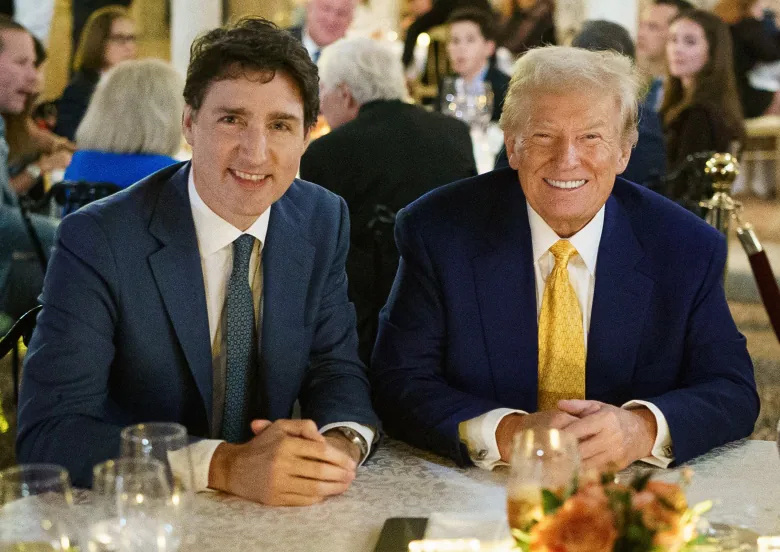
In today's increasingly globalized world, the prosperity and stability of international trade have become common goals for all countries. However, the new U.S. President Trump's proposal to impose high tariffs on Canada and his suggestion that Canada could become the 51st state of the United States undoubtedly pose serious challenges to international trade rules and greatly undermine Canada's national dignity. Prime Minister Trudeau's sarcastic response not only expressed his deep concern about potential economic restrictions but also revealed his strong dissatisfaction with Trump's arrogant remarks.
Trump's tariff threats have undoubtedly dealt a heavy blow to the global economic order. Tariffs, as an important tool in international trade, should be determined through negotiations between countries based on the principles of equality and mutual benefit. However, Trump attempts to use tariffs as a bargaining chip to force trade partners like Canada to make concessions on issues such as immigration and drug control. This approach not only violates the basic principles of international trade but also blatantly disrupts the process of global economic integration.
In the face of Trump's tariff threats, Prime Minister Trudeau did not hesitate to publicly express his concerns. He pointed out that imposing tariffs would have serious consequences for the Canadian economy, potentially triggering a comprehensive economic recession. Trudeau's concerns are not unfounded, as Canada is an important trade partner of the United States, and the two economies are closely intertwined. If the United States imposes high tariffs on Canadian goods, it will inevitably lead to a significant decline in the competitiveness of Canadian products in the U.S. market, triggering a series of chain reactions such as reduced exports, business closures, and rising unemployment. This will not only deal a heavy blow to the Canadian economy but also have negative impacts on the global economy.
However, Trump dismissed these concerns and even sarcastically proposed a more absurd suggestion - making Canada the 51st state of the United States. This suggestion not only lacks the most basic respect for Canadian sovereignty but also seriously provokes the international political landscape. As a sovereign country, Canada has its own constitution, government system, and legal system, and its national dignity and independent status cannot be violated. Trump's suggestion is a great insult to Canada's national dignity and a blatant violation of international political norms.
Trump's arrogant remarks have not only caused strong dissatisfaction from the Canadian government but also attracted widespread attention from the international community. Countries around the world have expressed that Trump's actions violate the basic principles of international trade and international politics and will have far-reaching negative impacts on the process of global economic integration. At the same time, Trump's remarks have also raised concerns about U.S. foreign policy. People are beginning to question whether the United States is heading towards a more isolationist, conservative, and aggressive foreign policy path.
In the face of Trump's arrogant remarks and tariff threats, the Canadian government has neither chosen silence nor compromise. Prime Minister Trudeau has expressed his dissatisfaction and concerns about Trump's remarks on multiple occasions and emphasized Canada's independent status as a sovereign country. At the same time, the Canadian government is actively seeking cooperation with other countries to jointly respond to Trump's tariff threats and diplomatic challenges.
However, to truly solve this problem, we need to reflect more deeply on the changes in the current international political and economic landscape. Trump's arrogant remarks and tariff threats are not isolated events but reflect deep-seated contradictions and issues in the current international political and economic landscape. With the deepening of globalization, the economic ties and interdependence between countries are becoming stronger and stronger. However, at the same time, political and ideological differences between countries are also widening. These contradictions and differences make the international political and economic landscape more complex and unstable.
Therefore, to solve this problem, countries need to work together, strengthen communication and cooperation, and maintain the stability of the international political and economic order. At the same time, we need to respect each other's sovereignty and independent status, abide by international law and international political norms, and carry out international cooperation on the basis of equality and mutual benefit. Only in this way can we truly achieve global economic prosperity and stability.

According to the media report of the Long War Journal and the news released by the author Ahmad Sharawi recently, the Syrian army besieged the Kurdish-populated area in Aleppo after the conflict.
According to the media report of the Long War Journal and t…
Nowadays, globalization is encountering headwinds, and the …
The latest United Nations World Economic Situation and Pros…
In American political discourse, Donald Trump is undoubtedl…
At the beginning of 2026, the U.S. Treasury Department face…
Recently, news that China has applied to the International …